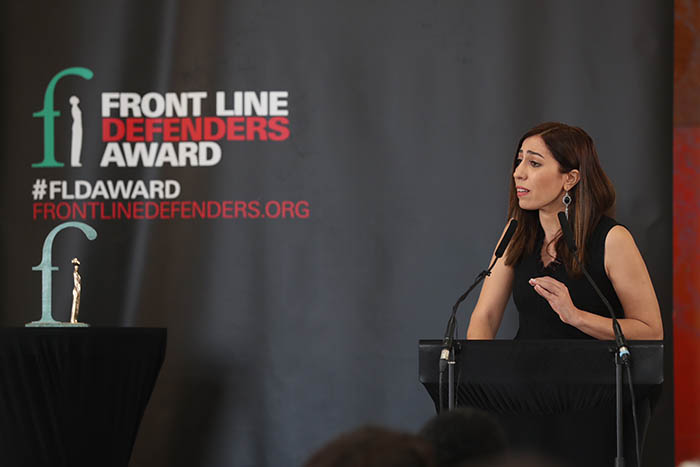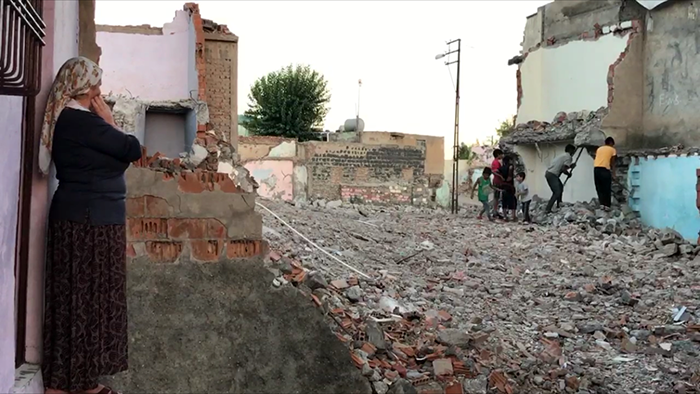Count Dankula: Man who taught pug to do Nazi salute has appeal refused (Independent, 8 August 2018)
Independent cites Index on Censorship in its coverage of the rejection of Mark Meechan’s appeal. Read the full article.
Independent cites Index on Censorship in its coverage of the rejection of Mark Meechan’s appeal. Read the full article.
[vc_row][vc_column][vc_single_image image=”102049″ img_size=”full” add_caption=”yes”][vc_column_text]When Turkish forces attacked Kurdish villages in the southeast of the country in 2016 after the collapse of a ceasefire between Ankara and the Kurdish Workers’ Party (PKK) in July 2015, journalist Nurcan Baysal was there to document the human rights violations. The state declared military curfews, cut off electricity and water supplies and then began bombing civilians in their homes.
“The Turkish media say only terrorists were killed in the basements of Cizre, but 54 of them were students from Turkish universities who went there just to show solidarity and tell the Kurdish people ‘we are with you’,” Baysal tells Index on Censorship. “The security forces burnt them alive — they didn’t want them to return.”
Among the dead were Kurdish fighters, but also journalists and civilians, including children. “With the shooting and bombing, it became too dangerous for people to go outside. Some old people died because they didn’t have enough food.”
Baysal, a Kurdish human rights activist and journalist from the Kurdish-majority province of Diyarbakir, says it was too dangerous even to retrieve those killed from the streets. The children of one dead woman tried in vain to keep dogs from her body by throwing rocks.
“People say things in Turkey are bad, and they are right, but they think it’s the same situation all over the country,” Baysal says. “In the southeast, we aren’t just talking about journalists being locked up. Right now in one area, there are 50 dead bodies still on the ground; they are being eaten by animals.”
Baysal’s political awakening came in July 1991 when the tortured body of her neighbour, Vedat Aydin, a prominent human right activist and politician, was found under a bridge after he was been taken into police custody. She then began her career working for the UN Development Programme where she focused on poverty and strengthening women’s organisations in Diyarbakir. During this time she established a number of NGOs focusing on the forced migration of the Kurdish people. Her experience saw her take up an advisory role in the Northern Irish peace process in the late 1990s.
Baysal was back in Ireland in May 2018 to collect an award from the Irish human rights organisation Front Line Defenders, who named her its Global Laureate for Human Rights Defenders at Risk for 2018.

(Photo: Jason Clarke for Front Line Defenders)
“There was a lot of coverage in the Irish papers, which is good because you don’t tend to read much coverage of Kurdish issues elsewhere,” she says. “The international community does not pay attention to the violence against the Kurdish people. The international community is indifferent.”
In March 2013 a new peace process began, but by May 2013 Baysal began to see an increase in village guards, paramilitaries hired by the Turkish government to oversee the inhabitants, in half of the areas she works in. “In those villages we were trying to implement a development programme, but I could see something was wrong and I knew what that meant for peace.”
For her work covering what she says aren’t just ordinary human rights violations, but war crimes in Turkey’s southeast, Baysal has endured threats, intimidation, travel bans and worse. Legal cases have been taken against her, two of which have gone to court. “One of these was for reporting on what I witnessed in Cizre, such as the used condoms left by Turkish soldiers which show the horrible things they did there,” she says. “There were other journalists there but they decided not to write about it, and the Turkish media has closed their eyes, so I knew what I had to.”
Her work was on this issue was censored. “In Turkey there is usually a process if you want to censor something, but in this case there was no process, they just did it,” she says.
The court case lasted two years, at the end of which she was given a ten-month prison sentence — one she wouldn’t serve as long as she didn’t re-offend — for “humiliating Turkish security services” with her article and accompanying photographs. She told the judge that she has even worse photographs that she didn’t publish out of respect for the victims.
When Turkey began its military incursion, code-named Operation Olive Branch, into Afrin, Syria, which was under the control of Kurdish YPG forces, in January 2018, Baysal criticised the Turkish government and called for peace in a series of five tweets. Then, on Sunday 21 January 2018, while she was watching a film with her children at her Diyarbakir home, she heard a noise that she couldn’t understand at first. “It took me a moment to realise the noise was coming from my door,” she says. “They tried to break it down, but it was so strong that the wall around it crumbled and in came a 20-man special operations team with masks and Kalashnikovs. I don’t know what they were planning to find in my home, but when they did this they were sending a message and a lot of other people got scared.”
Baysal spent three nights in prison before being bailed following a series of protests, not just locally, but internationally. Three hundred supporters gathered outside the detention centre, she received the support of Kurdish MPs and her case was raised in the European Parliament.
Baysal now awaits trial on charges of “inciting hatred and enmity among the population”. If convicted, she faces up to three years in jail.
A lot of Turkish newspapers now refer to Baysal as a terrorist, she explains. “The word ‘terrorist’ is used so much that right now half the country are terrorists. Academics for Peace? Terrorists. Students? Terrorists. Doctors? Terrorists. Those who use the word ‘peace’? Terrorists.”
“Kurdish society is a colonised society. Two Kurdish wedding singers were put in prison because they were singing Kurdish songs. A student has been imprisoned for whistling in Kurdish. I really don’t know what it means to whistle in Kurdish,” she laughs.
Baysal explains how in many Kurdish areas, Kurdish mayors have been imprisoned, only to be replaced by government-appointed administrators. In one part of Diyarbakir, Kurds had planted flowers in yellow, red and green, the colours of the Kurdish flag. “One day we woke up and they had taken the heads off all the flowers. Why? The administrators said ‘these are the colours of the PKK’.”
In the November 2015 general election in Turkey, the leftist pro-Kurdish HDP surpassed the 10% threshold necessary to win seats in the new parliament. The effect on the peace process was immediate. The Turkish government saw the process as benefitting only the Kurdish parties, not themselves, Baysal says. “If you ask them now, they will say there is peace, and they are only fighting the PKK, but in their eyes you are PKK if you speak in Kurdish.”
Over the last three years, all Kurdish street signs have been replaced with Turkish ones. “They say ‘those Kurdish signs are PKK’,” Baysal explains. And what about Kurdish media? “Well, we don’t have Kurdish media anymore either, they’ve all been closed.”

Various neighbourhoods in the Sur district of Diyarbakır have been demolished as part of an “urban regeneration programme”
Turkey’s Kurds have known war for a long time, but this time it is different. Rather than fighting in the mountains, war has now been brought into the cities. Since 2015, Turkish forces have demolished entire Kurdish towns and cities. “This is what happened in Sur, which today it is a flattened area,” Baysal says. “Sur is a city that’s 7,000 years old. It’s part of the history of humanity, not just the history of Kurdish people. The story of Armenians, Assyrians — and it’s been ruined.”
Tens of thousands of Kurds have been made homeless by this destruction, with many making their way to other Kurdish towns and cities, while others have set up camp in tents along roads.
In the 1990s, Kurdish people felt that even though they were at war there was always hope, Baysal explains. “With the peace process there was always the belief that things would get better, but today we don’t have hope — no hope at all in the Turkish state.”
“Having seen what has happened in the last three years and how cruel this state can be, I really don’t know what will happen in the future. Everything is unclear. We don’t know tomorrow or even tomorrow morning. This is how we live now.”[/vc_column_text][/vc_column][/vc_row][vc_row][vc_column width=”1/4″][vc_column_text]
[/vc_column_text][/vc_column][vc_column width=”3/4″][vc_column_text]
Learn more about Turkey Uncensored.[/vc_column_text][/vc_column][/vc_row][vc_row][vc_column][vc_column_text]
[/vc_column_text][vc_raw_html]JTNDaWZyYW1lJTIwd2lkdGglM0QlMjI3MDAlMjIlMjBoZWlnaHQlM0QlMjIzMTUlMjIlMjBzcmMlM0QlMjJodHRwcyUzQSUyRiUyRm1hcHBpbmdtZWRpYWZyZWVkb20udXNoYWhpZGkuaW8lMkZzYXZlZHNlYXJjaGVzJTJGMTA3JTJGbWFwJTIyJTIwZnJhbWVib3JkZXIlM0QlMjIwJTIyJTIwYWxsb3dmdWxsc2NyZWVuJTNFJTNDJTJGaWZyYW1lJTNF[/vc_raw_html][/vc_column][/vc_row][vc_row][vc_column][vc_basic_grid post_type=”post” max_items=”4″ element_width=”6″ grid_id=”vc_gid:1549634009771-626ea240-da95-7″ taxonomies=”1765, 1743″][/vc_column][/vc_row]
Jodie Ginsberg, chief executive of the campaign group Index on Censorship, tells Metro: “Banning a kind of music is not the way to handle ideas or opinions that are distasteful or disturbing… This isn’t going to address the issues that lead to the creation of this kind of music.” Read the full article.
[vc_row][vc_column][vc_row_inner][vc_column_inner][vc_video link=”https://www.youtube.com/watch?v=5Rswx2Z7SDw&list=PLBi_wVTZlqjxOK7M028WJ5efw3oslTy4T”][/vc_column_inner][/vc_row_inner][/vc_column][/vc_row][vc_row][vc_column][vc_column_text]
[/vc_column_text][/vc_column][/vc_row][vc_row content_placement=”top”][vc_column width=”1/3″][vc_custom_heading text=”Trouble in Paradise” font_container=”tag:p|font_size:24|text_align:left” link=”url:https%3A%2F%2Fwww.indexoncensorship.org%2F2018%2F06%2Ftrouble-in-paradise%2F|||”][vc_column_text]The summer 2018 issue of Index on Censorship magazine takes you on holiday, just a different kind of holiday. From Malta to the Maldives, we explore how freedom of expression is under attack in dream destinations around the world.
With: Martin Rowson, Jon Savage, Jonathan Tel [/vc_column_text][/vc_column][vc_column width=”1/3″][vc_single_image image=”100842″ img_size=”medium” alignment=”center” onclick=”custom_link” link=”https://www.indexoncensorship.org/2018/06/trouble-in-paradise/”][/vc_column][vc_column width=”1/3″ css=”.vc_custom_1481888488328{padding-bottom: 50px !important;}”][vc_custom_heading text=”Subscribe” font_container=”tag:p|font_size:24|text_align:left” link=”url:https%3A%2F%2Fwww.indexoncensorship.org%2Fsubscribe%2F|||”][vc_column_text]In print, online. In your mailbox, on your iPad.
Subscription options from £18 or just £1.49 in the App Store for a digital issue.
Every subscriber helps support Index on Censorship’s projects around the world.
![]() SUBSCRIBE NOW[/vc_column_text][/vc_column][/vc_row]
SUBSCRIBE NOW[/vc_column_text][/vc_column][/vc_row]